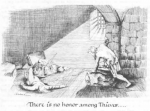Bacon Bits
Legend
Assuming that we will play an adventure involves much dungeon crawling (say, White Plume mountain) using 5e rules, how much important to have a pure-rogue?
Should we have at least one dedicated dexterity-based-rogue?
Or some other class with a level dip of rogue (for proficiency to Thieve's Tools and Expertise class feature) is enough?
How about a character of completely different class (say, a Barbarian) who is just proficient in Perception skill and Thieve's Tools (from background)?
You can get Thieves' Tools proficiency with a background pretty easily. That's good enough on a Dex-based character Even then, however, you don't really *need* the ability unless your DM is particularly fond of traps and locks. If the DM is following the DMG guidelines, traps and locks will be easy enough to survive or bypass through other means. Doing so will be more costly, sure, but it's not mandatory.
For Perception I would say that the party benefits from having multiple characters proficient.
DCs only realistically go up to 30.
I would say that DCs realistically only go up to 25. I think I've seen DCs higher than even 20 about a dozen times, and that's usually stuff like lifting a portcullis (which multiple characters can participate in) or saving throws of demon princes and the like. I don't ever recall seeing anything over DC 25.
Locks are so easy...
Locks aren't intended to be hard. It's D&D, not a video game. The world isn't made from indestructible polygons. You can bypass a lock pretty easily in most cases. The difficulty is doing so quickly and quietly.



